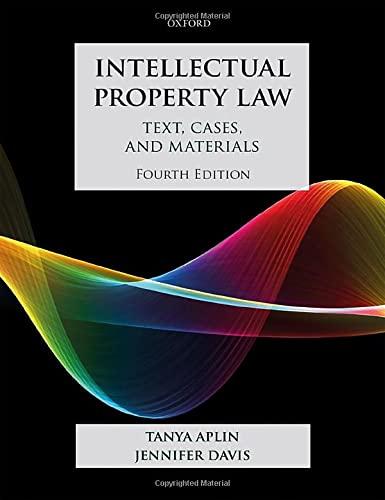Question
Questions: Please Paraphrase these paragraphs. Petitioner inmate challenged a judgment of the Court of Appeals for the Fifth Circuit that affirmed the district court's denial
Questions: Please Paraphrase these paragraphs.
Petitioner inmate challenged a judgment of the Court of Appeals for the Fifth Circuit that affirmed the district court's denial of his motion to vacate or correct his sentence. The inmate was convicted under the Federal Bank Robbery Act, 18 U.S.C.S. 2113, of a bank robbery offense and also of entering the bank with the intent to commit a felony. He was sentenced to consecutive sentences of 20 years for robbery and 15 years for entering. The Court considered whether unlawful entry and robbery were two offenses consecutively punishable in a typical bank robbery situation. The Court examined the Federal Bank Robbery Act, 18 U.S.C.S. 2113, and its legislative history and determined that it was manifestly the purpose of Congress to establish lesser offenses. Reversing, the Court held that there was no indication that Congress intended also to pyramid the penalties. The Court concluded that when Congress in the Bank Robbery Act made either robbery or an entry for that purpose a crime it intended that the maximum punishment for robbery should remain at twenty years, but that, even if the culprit fell short of accomplishing his purpose, he could be imprisoned for twenty years for entering with the felonious intent. The judgment of the appellate court was reversed, and the case was remanded to the district court for the purpose of re-sentencing the inmate in accordance with the Court's opinion.
Appellant defendant sought review of a denial for a writ of habeas corpus that was sustained by the Fourth Court of Appeals, Atascosa County (Texas). Appellant filed for the writ while awaiting retrial for capital murder and contended that should he be convicted for a second time, it would be a violation of the double jeopardy clauses of the federal and state constitutions if his punishment were not automatically fixed at life imprisonment. Appellant defendant was convicted of capital murder, murder committed in the course of committing or attempting to commit the offense of robbery under Tex. Penal Code Ann. 19.03(a)(2), in a jury trial, but was sentenced by the judge to life imprisonment. The conviction was reversed on appeal, when the reviewing court found trial error because the judge did not negatively answer the mandatory special issues under Tex. Crim. Proc. Code Ann. 37.071 or make any finding favorable to appellant. Appellant then sought review of a denial for a writ of habeas corpus, arguing that it would be a violation of the double jeopardy clauses of the federal and state constitutions if he were sentenced after a retrial to anything other than life imprisonment. The court affirmed the denial of the writ, holding that double jeopardy did not attach because the first trial was reversed on trial error, that no favorable findings of fact on appellant's behalf were made, and that appellant was granted a trial de novo. The first court did not "acquit" appellant of the death penalty and had no discretion to do so, and therefore, appellant was eligible for retrial on guilt and for sentencing. The court affirmed the denial for the writ of habeas corpus by appellant capital murder defendant, holding that double jeopardy did not attach because the first trial verdict was reversed because of trial error. There was no evidence that appellant was acquitted of the death penalty at his first trial because he was sentenced only to life imprisonment and that there was no favorable finding to appellant on any issue of ultimate fact.
Appellant parents of the patient challenged a judgment of the 401st Judicial District Court, Collin County, Texas, granting appellees, an emergency department physician and a radiologist, summary judgment under Tex. R. Civ. P. 166a(i) in the parents' health care liability action. On appeal, the court held that the parents' claims were for injuries arising out of the provision of emergency medical care and therefore Tex. Civ. Prac. & Rem. Code Ann. 74.001(a)(7), 74.153 (2005) applied because appellees' actions were in response to the patient's presentment at the emergency department after experiencing sudden and severe pain, and one of the possible diagnoses of condition, testicular torsion, would, if correct, result in the loss of the testicle if not treated properly. The court held that the trial court erred by granting the physician summary judgment because the testimony of the expert, that the expert believed that the physician tried to care for the patient and did not intend to harm him, was insufficient to disprove gross negligence. However, summary judgment was proper for the radiologist because while the parents' expert opined that the radiologist was negligent in concluding that the ultrasound showed that the patient had normal testicular flow in the left testicle, the expert's report did not raise a fact issue about whether the radiologist's error was gross negligence. The portion of the judgment granting the radiologist's no-evidence summary judgment motion was affirmed, but the judgment granting the physician summary judgment was reversed, and the case was remanded for further proceedings.
Step by Step Solution
There are 3 Steps involved in it
Step: 1

Get Instant Access to Expert-Tailored Solutions
See step-by-step solutions with expert insights and AI powered tools for academic success
Step: 2

Step: 3

Ace Your Homework with AI
Get the answers you need in no time with our AI-driven, step-by-step assistance
Get Started


